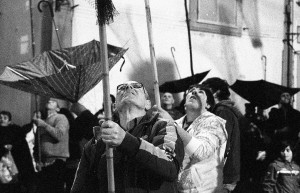In their opening salvos this month at Harriet, both Camille Dungy and Linh Dinh confirmed what I had long expected to be the case: that poetry in America has a life of its own beyond the ivied halls of academe and the smoke-free ruckus of downtown Manhattan. Likewise, poets – the published ones – will eventually, if they persist, be sought out by, or simply trip over, their unpublished brethren: poets, poetasters, readers of verse and other concerned parties. In both Dungy’s and Dinh’s treatments, this ecumenical crowd, it turns out, is comprised of people surprisingly just like them. Both poets idealize what they find – colorful souls going about their lives, who, contrary to the unmentioned (though implicitly rampant) majority, have made room for poetry. And why shouldn’t they be idealized?
After all, besides being individuals with whom licensed poets (individuals as well) can connect, they represent a prelapsarian sense of integration which, when things were integrated, didn’t need to declare itself – it was simply everything that was the case, as Wittgenstein pointed out in Proposition I of the Tractatus. Now that things have disintegrated, any reminder of wholeness gives poets (even more so than others) a sense of purpose. How does it do this? It reminds them of their own innocence, reminds them of their pre-professional selves and of a world in which poetry was still a vocation, before it became a career.
In truth, the need for such identification is so compelling and the chances for satisfying that need so unlikely that I am forced to believe that Camille and Linh have invented their protagonists, that these people, the carpetmonger and the exiled legionnaire, are simply fanciful alter egos, that Camille has never been to Brooklyn and Linh wouldn’t set foot in El Paso if you paid him.
I had no reason not to take the accounts of these two poets at face value. But in both cases the crucial encounter seemed drawn more from our collective cultural heritage than from the grayscale of life. Recall Aristotle in the Poetics who told us that events in a narrative should be plausible rather than truthful. Both of these authors enhance the plausible so thoroughly that it becomes more truthful than the truth. Camille’s extensive conversation through the curtains of a Brooklyn dressing room seems to reverse the paradigm in The Wizard of Oz. Here in the Magical Kingdom of Flatbush, the wizard is confessing to Dorothy and instead of No, No, No it’s Yes, Yes, Yes. You can have your brain; you can have your heart!
I so wanted to believe in this scenario.
Linh’s bar scene is nothing so much as a rescripting of one of the final segments in Under The Volcano, words filtering up through layers of ethylated mists and wafting towards the reader in sleights of syntax. Instead of the Consul and his fat package of envelopes, an unsung poet is plucked off a bar stool and put to singing in liquored, aeolian bliss as his understudy (“more or less a writer”) begs him to jot down what he is Homerically recalling and the bartender, not Diosdado, but a beaming young woman, is enlisted to create the needed quorum.
Fernando Pessoa reminds us in “Autopsicografia” that “O poeta é um fingidor.” The poet is a faker. “Finge tão completamente…” He fakes so thoroughly… “Que chega a fingir que é dor…” That he ends up faking that it’s pain… “A dor que deveras sente…” The pain he really feels.
Surely poetry in America has a life of its own beyond the storied institution of Poetry. It is there in Brooklyn haberdasheries and El Paso dives. But can we count on poets themselves to tell us about it? Or expect poets to take part in it? That would be like inviting a waiter to sit down and have lunch with us.
Martin Earl lives in Coimbra, in central Portugal. From 1986 until 2001 he lectured in English, translation...
Read Full Biography


